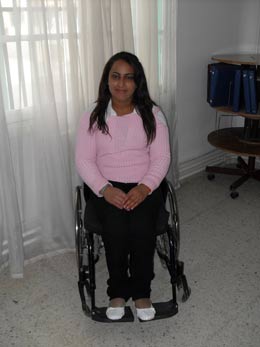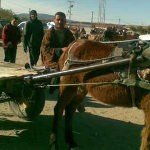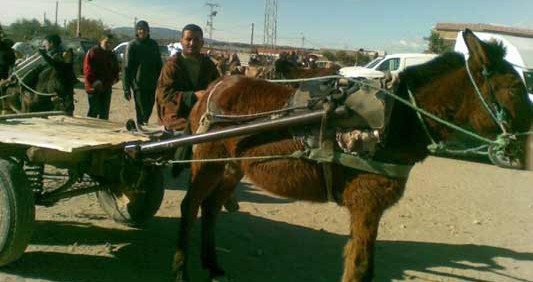Fadhila is 21 years old and has a beautiful smile. She is from Téboursouk (the former Thubursicum Bure) whose past is more glorious than the present. Téboursouk is situated at 105 km west of Tunis, and about fifty kilometres away from Béja, the administrative centre of the Governorate (department). It looks over some of the richest lands. However the village does not seem to benefit from the prosperity of its history and neither from its geography.  Similarly to all the children of the country, Fadhila studied at the primary school up till the 9th grade. During this year, she lost the use of her legs due to a serious illness and was obliged to stay at home. Fadhila returned to school where she followed a course in sewing and glass painting offered by The National Centre for Professional Rehabilitation for the Disabled.
Similarly to all the children of the country, Fadhila studied at the primary school up till the 9th grade. During this year, she lost the use of her legs due to a serious illness and was obliged to stay at home. Fadhila returned to school where she followed a course in sewing and glass painting offered by The National Centre for Professional Rehabilitation for the Disabled.
The least one can say is that in Tunisia the disabled are not left to their own devices. Thanks to the Tunisian Federation of Sports for the Handicapped, she discovered a discipline in which she excelled and in which she invested all her hopes: shot and javelin. Fadhila trained for two hours a day and the Federation gave her precious support. The training bore results quickly: she ranked second in the Arab world and sixth on an international level at the Meeting Tunis, an event which took place in June 2002. Fadhila can rightly start having other ambitions. She is working hard to participate in the world championships which will be held in New Zealand in 2010 and for a place on the podium at the London Paralympics in 2012. Fadhila has other projects: to obtain a diploma in computer science and another in the French language which, according to her will enable her to have a better level of education. She does not intend to get married or to build a family because this would be too big a responsibility for her. It is already difficult to take care of herself she thinks. Her experience with her parents undoubtedly affected this choice. Her relationship with her parents is excellent but she lived tension and conflicts often linked to her handicap. She explains that in the rural milieu, the mentalities do not accept the handicap. Besides, since the family had no material means to reduce her suffering, Fadhila often feels rejected.
Fadhila is well-placed to feel the need for progress. According to her, modernity and new technology are truly the means needed to achieve the progress required for everybody's fulfilment. Although she does not quite understand the concept of globalisation, she does understand that the world has become a little village thanks to the means of communication and to the new technologies which fascinate her. For example, the Internet is an incontrovertible tool for her, an extraordinary opening to the world. Fadhila has Internet access thanks to the Centre for the Disabled. However it seems that this opening is not enough because Fadhila hopes to emigrate as soon as possible. Her preferred destination: Germany.
The prospect of Tunisia becoming a destination for African migration does not bother her. She is even shocked by the behaviour of some Tunisian shop keepers who double the prices when dealing with Africans. For Fadhila nationality or religion does not matter. The other is inevitably enriching. All that is needed is that human beings get together to refute all prejudices. One must go beyond preconceived ideas. And sports allows this marvellously. Fadhila is not interested in politics. Around her, she pities certain youngsters, for example those who take drugs. Being victims, they do not see themselves falling in the trap of drugs. One must not even try, not fall into the temptation of tasting. Personally, Fadhila does not feel concerned; it concerns rich people's children in fact. One only has to see those who come for a detox treatment at Jebel ELoueste, next to the spa where she goes from time to time. Mostly they are daddy's boys. For Fadhila, being young means the ability to be able to juggle all these activities: outings, sports, going to the disco, going to the theatre and dressing fashionable clothes. It might also mean meeting someone. For Fadhila, knowing someone her age is important. Love is an essential thing but she does not agree with sexual liberty which is inadequate with our moral values, she explains. She lauds sexual abstinence, which is the best way to be protected against STDs. But all these dreams are only possible in Tunis. This means that she must live in Tunis, inevitably. There is no theatre and neither a disco in Béja let alone in Téboursouk. Being young might mean answering to the call of the big cities. This at least gives her the benefit of relieving her and relieving her father from the ordeal of the path leading to her home.
young mediterraneans
On the Podium Despite Everything: Portrait of a Young Tunisian Woman
Fadhila can now have other ambitions. She works hard to participate to the World Championships taking place in New Zealand in 2010 and to go on the podium for the Paralympic Games of London in 2012.
ilgili haberler
Hak odaklı, çok sesli, bağımsız gazeteciliği güçlendirmek için bianet desteğinizi bekliyor.
bu haberin uzantıları
ilgili haberler
diğer yazıları





